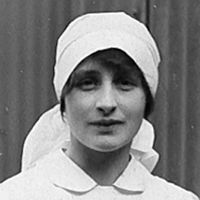Vera Brittain facts for kids
Quick facts for kids
Vera Brittain
|
|
|---|---|

Brittain shortly after the First World War
|
|
| Born | Vera Mary Brittain 29 December 1893 Newcastle Under Lyme, Staffordshire, England |
| Died | 29 March 1970 (aged 76) Wimbledon, London, England |
| Occupation |
|
| Alma mater | Somerville College, Oxford |
| Genre | |
| Notable works | Testament of Youth |
| Spouse | Sir George Catlin |
| Children | John Brittain-Catlin Shirley Williams |
Vera Mary Brittain (born December 29, 1893 – died March 29, 1970) was an English writer, nurse, and activist. She was known for her strong beliefs in feminism (equal rights for women), socialism (fairness in society), and pacifism (peace, against war).
Her most famous book, Testament of Youth, was published in 1933. It tells the story of her experiences during World War I and how she became a pacifist.
Contents
Early Life and Education
Vera Brittain was born in Newcastle-under-Lyme, England. Her father, Thomas Arthur Brittain, owned paper mills. Her mother was Edith Mary Brittain.
When Vera was very young, her family moved to Macclesfield, and later to Buxton. She had one younger brother, Edward Brittain, who was her closest friend growing up.
From age 13, Vera went to St Monica's, a boarding school in Kingswood, Surrey. Her aunt was one of the school's leaders.
After finishing school, Vera wanted to study at Somerville College, Oxford. Her father did not want her to go, but she convinced him. She began studying English Literature there.
World War I Experiences
When World War I started, Vera's studies felt unimportant. Many young men, including her brother and his friends, joined the army.
Vera became engaged to Roland Leighton, one of her brother's friends. In 1915, she left Oxford to become a Voluntary Aid Detachment (VAD) nurse.
She worked in hospitals in Buxton and London. Later, she nursed soldiers in Malta and France, close to the battlefields. She even cared for German prisoners of war. This experience helped her believe in peace and international understanding.
Tragically, Vera lost many loved ones in the war. Her fiancé, Roland Leighton, was killed. Her close friends, Victor Richardson and Geoffrey Thurlow, also died. Finally, her beloved brother Edward was killed in 1918. Their letters to each other during the war were later published as Letters from a Lost Generation.
Life After the War
After the war, Vera returned to Oxford in 1919 to study history. It was hard for her to adjust to life after experiencing so much loss.
At Oxford, she met Winifred Holtby, and they became very close friends. They both wanted to be successful writers in London. Winifred later lived with Vera and her husband. Their friendship lasted until Winifred's death in 1935.
In 1925, Vera married George Catlin, a political scientist. They had two children: a son named John and a daughter named Shirley Williams. Shirley later became a famous politician in the UK.
Vera Brittain's Writings
Vera Brittain wrote many books and articles. Her first novel, The Dark Tide (1923), caused some talk because it made fun of professors at Oxford.
Her most famous book, Testament of Youth (1933), tells her story of the First World War. She also wrote two more books that continued her life story:
- Testament of Friendship (1940) was a tribute to her friend Winifred Holtby.
- Testament of Experience (1957) covered her life from 1925 to 1950.
Many of Vera's novels were based on her real-life experiences and the people she knew. For example, her novel Honourable Estate (1936) included parts of her own life, like her brother Edward's death in the war. Her diaries from 1913 to 1917 were published in 1981 as Chronicle of Youth.
Activism for Peace
In the 1920s, Vera was a well-known journalist. She wrote for many newspapers and magazines. She also spoke often for the League of Nations Union, which promoted countries working together for peace.
By 1937, Vera officially joined the Peace Pledge Union, a large group in Britain that believed in peace. She also joined the Anglican Pacifist Fellowship. Her strong belief in peace, which was inspired by her Christian faith, became even more important during World War II. She wrote a series of letters called Letters to Peacelovers.
Vera was a very active pacifist. She worked as a fire warden during the war. She also raised money for the Peace Pledge Union's food relief efforts. She spoke out against the heavy bombing of German cities, which was not popular at the time. Her booklet on this topic was called Seed of Chaos in Britain.
Because of her strong views, her name was included in the Black Book by the Nazis. This list contained nearly 3,000 people who would be arrested if Germany invaded Britain.
From the 1930s onwards, Vera regularly wrote for the pacifist magazine Peace News. She became part of its editorial team. In the 1950s and 1960s, she wrote articles against apartheid (racial segregation) and colonialism (one country controlling another). She also supported nuclear disarmament, which means getting rid of nuclear weapons.
Later Years and Legacy
In 1966, Vera had a fall that caused her health to decline. She passed away in Wimbledon on March 29, 1970, at age 76.
Vera had asked for her ashes to be scattered on her brother Edward's grave in Italy. She wrote that "much of my heart has been in that Italian village cemetery" for nearly 50 years. Her daughter carried out this wish. Some of her ashes were also buried with her husband in England.
Vera Brittain's life and writings have inspired many.
- In 1979, a BBC2 TV series called Testament of Youth was made about her life.
- In 1998, her letters from World War I were published as Letters from a Lost Generation. They were also made into a Radio Four series.
- In 2014, a feature film based on her memoir, Testament of Youth, was released.
Plaques can be found on her former homes in places like Newcastle-under-Lyme, Buxton, and London. Her collection of papers is kept at McMaster University in Canada.
Images for kids
-
Tombstone of Edward Brittain, Granezza British Cemetery, Asiago Plateau
Biographies
- Vera Brittain by Hilary Bailey. Penguin Books, 1987.
- Vera Brittain: A Life, by Paul Berry and Mark Bostridge. Chatto & Windus, 1995.
- Vera Brittain: A Feminist Life, by Deborah Gorham. University of Toronto Press, 2000.
- Vera Brittain and the First World War, by Mark Bostridge. Bloomsbury, 2014.
See also
 In Spanish: Vera Brittain para niños
In Spanish: Vera Brittain para niños
 | George Robert Carruthers |
 | Patricia Bath |
 | Jan Ernst Matzeliger |
 | Alexander Miles |





